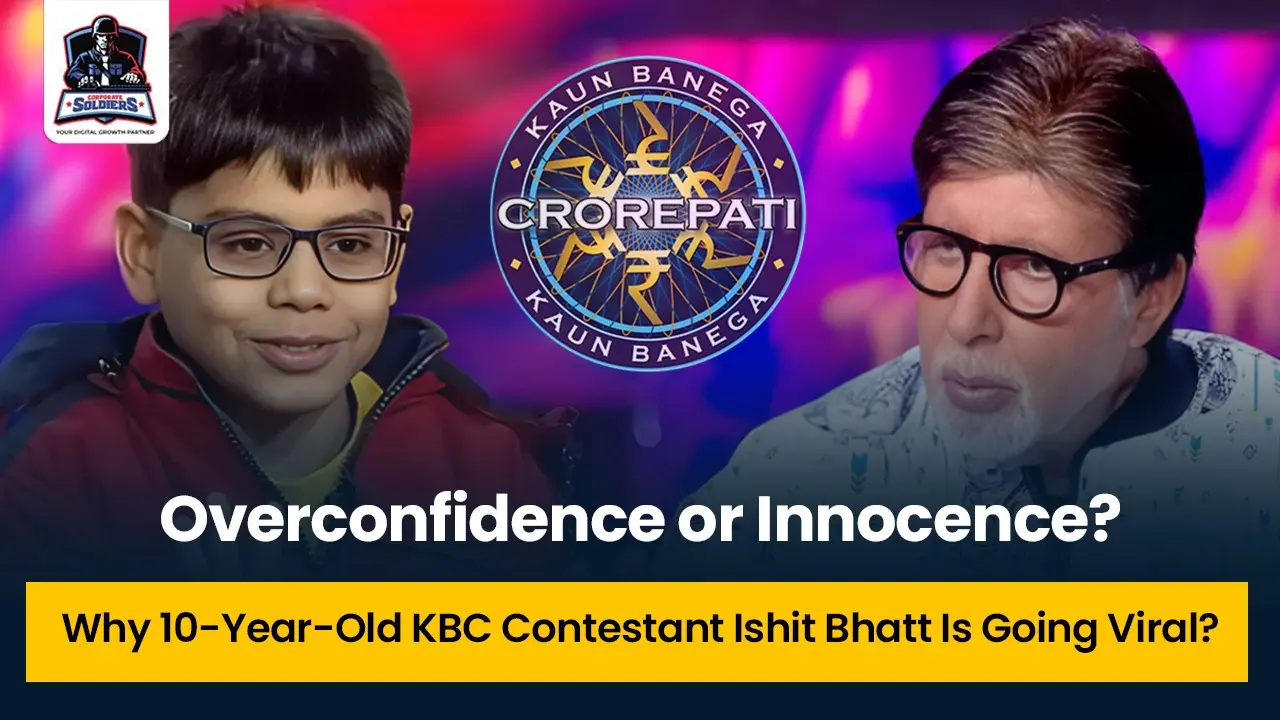‘Attitude is a little thing that makes a big difference.’ – Winston S. Churchill
Indeed, attitude is something that can make you or break you. It is something you carry along, and it can give you immense confidence. But we all know that there is a thin line between confidence and overconfidence. The overconfidence brings arrogance, and it is arrogance that is taking you nowhere. Therefore, it is the attitude that creates this chain of series. But why are we, the Corporate Soldiers, talking about this? We have a reason to talk about it. Recently, something happened on the sets of Kaun Banega Crorepati. A ten-year-old kid named Ishit Bhatt is going viral, but not for something positive. This kid from Gandhinagar, Gujarat, recently appeared as a contestant on Kaun Banega Crorepati 17.
What was meant to be a display of knowledge turned into something else, and how Ishit ended up as a viral social media meme and trolling across the country. Let’s see what happened and why everyone is talking about behaviour lessons and attitude.
What Happened On KBC?
Impatience takes you nowhere, and that’s how this young contestant ended up with nothing. Ten-year-old Ishit Bhatt, a contestant on Kaun Banega Crorepati Season 17, has been termed the rudest kid ever because of his impatience and constant interruptions. People are naming him a rude kid as his interaction with Amitabh Bachchan during his episode is being circulated all over social media. During a question about the Ramayana, Ishit didn’t wait to hear all the choices; he became quite impatient and loudly insisted the answer was ‘Ayodhya Kanda’. He was confident, but incorrect; the right answer was ‘Bala Kanda’.
Throughout the show, Ishit was very impatient; he kept wanting to lock his answers before listening to all the options and talked over Amitabh several times. Now, everyone, whether they have a kid or not, is indulging themselves in conversation on parenting, overconfidence, and child psychology. But empathy is nowhere.
What Did Ishit Do?
Overconfidence or innocence, Ishit probably didn’t see much into it. Maybe it’s just he couldn’t contain his excitement to be on such a big platform, little did he know he would end up as a hot topic of debate. The fifth-grader made headlines after telling the host Amitabh Bachchan, ‘Mere ko rules pata hai, isliye aap mereko abhi rules samjhane mat baithna’. This statement, which indeed sounds inappropriate and disrespectful, was the first to go viral. But when he repeatedly interrupted Bachchan with phrases like ‘Arre option daalo’ (Give me the options) and insisted on locking answers before hearing all choices, Ishit was termed as the most rude kid ever to appear on KBC. Though there were people who were amused cause of his assertiveness, but irritated many, especially when he lost after incorrectly answering a Ramayana question.
As a consequence of it, Ishit became a viral trolling began everywhere within hours. People started making memes, mocking edits, and angry comments labeling him ‘the most hated kid on the Internet.’ However, there were others who left concerned about this kid, including singer Chinmayi Sripada, who defended him and condemned adults for bullying a ten-year-old child online.
What Child Psychology Says?
Let’s become responsible adults and understand the child’s psychology and behaviour first. So, what do child psychologists say about such behaviour? Normally, many child psychologists argue that behaviour, such as Ishit’s, doesn’t appear in isolation. In isolation, kids don’t behave in such a way. But such behaviour occurs and is shaped by temperament, environment, and exposure. Yes, exposure, an important factor in such behaviour. They say that boldness and assertiveness in children can reveal a strong sense of autonomy and cognitive clarity. But not necessarily disrespect, because it has a strong reason behind it.
The developmental psychology says that between the ages 8-12, children are in a different stage. Jean Piaget described this stage as the ‘Concrete Operational Stage.’ Here, the cognition of a child is logic-based rather than emotional. This means their cognition is still emotionally unfiltered. And every kid behaves differently in a certain environment. Hence, when you place a kid in high-attention environments (like national television), excitement easily becomes impulsivity. That’s what happened in Ishit’s case.
| Psychological Factor | Explaination | Outcome in Public Scenario |
| Temperament | Innate energy, Sensitivity, Assertiveness | May appear as overconfidence |
| Parental Modelling | Tone, Assertiveness and Responses of Parents | Authority display |
| Social Reward Loop | Social validation, Applause Release Dopamine | Excessive energy leads to less inhibition |
| Erikson’s Ego Development Model | Stage of ‘Industry vs Inferiority’ | Desire to prove competence to adults |
| Media Exposure | Early Screen Presence Normalizes Performance Behaviour | Confidence without empathy |
We Need to Monitor Adult Internet Behaviour First
Social media tends to interpret confidence through adult filters. Now, dear readers, think whether this digital discipline is necessary for the child or not. Where are we heading? Why can’t we take heed of adult internet behaviour first? This whole fiasco or incident tells us more about adult internet behaviour than a child’s. Online users are indulging in abusive, personal insults, drawing their parents into the debate. Many parents are even blaming Ishit’s behaviour on bad upbringing by his parents. This is what we are seeing on every social media platform. Now what will happen to that little kid? We are afraid he will ever be able to regain his confidence, as we know child psychologists say the public shaming of minors affects long-term self-esteem.
There are many such instances and studies that show how online humiliation at an early age can lead to hypervigilance, anxiety, empathy withdrawal, and self-criticism in adolescence. The children process social rejection differently from adults because the prefrontal cortex (responsible for emotional regulation) isn’t fully developed until late teens. Thus, such aggressive viral trolling will lead to performance anxiety, avoidance of public expression, or overcompensation in future behaviour. Then why don’t we monitor adult internet behaviour first?
What Did The Host Big B Say?
Let’s hear from the host Amitabh Bachchan, who said something that can make stoics proud. He responded with a subtle grace, ‘Kabhi kabhi bachhe overconfidence mein galti kar dete hain’ (Sometimes children make mistakes due to overconfidence).
This statement is indeed true. The kid was being a kid, but adults are not. Adults made Ishit Bhatt a meme template. So, tell us, ‘Have we lost the ability to distinguish a child’s exuberance from arrogance?’
Let’s Show A Bit of Empathy
The trolling wave seems more immature than the child himself. Whether or not Ishit’s behaviour was appropriate, the reaction shows a bigger issue for Indians, our comfort with public humiliation, even when it targets a ten-year-old. Empathy, not outrage, must define how society interacts with children in the media spotlight. Reality shows are not examinations of morality; they are just a few glimpses of personality, don’t they? Let’s think about these actual questions. Corporate Soldiers seeks a bit of empathy for every child!










